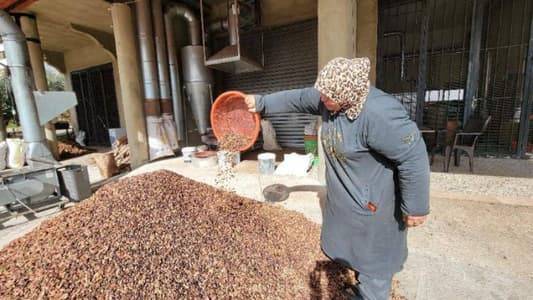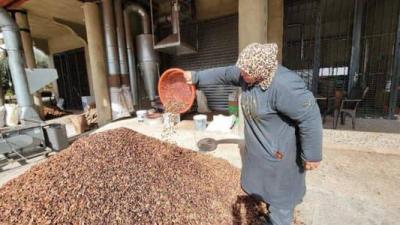For long hours, Kamila Hamza, a woman in her fifties, sits opening pine cones. This has been her job for a long time, as she is the only one in the Nabatieh area who owns a pine nut processing facility which she runs with her son. She does not hide the difficulty of the work, but she insists that it has become her only source of income. In front of the pine processing facility in the town of Kfar Rumane, Kamila sits surrounded by pine cones; this work, as she says, is labor-intensive and requires special effort due to its challenges. Although the cost of a kilogram of pine nuts does not exceed 100,000 L.L. at the facility, a price she finds limited compared to the amount of effort involved, she confirms that she will not stop and will continue with the process of extracting the pine seeds from the cones, preparing them for the next stage.
The journey of extracting pine nuts goes through more than six stages, starting from opening the cones, removing the seeds, cleaning, washing, and then moving to the crushing machine, which produces white pine nuts, or "white oil," due to its high price that has approached 60 dollars per kilogram. Kamila divides her tasks among all the machines, being well-versed in the profession. Thanks to this work, she has raised her children and continues to help them navigate life's challenges. However, what pains her is that the costs of the work have become exorbitant: "What I produce goes to pay for the generator subscription, which has a monthly bill of 30 million L.L." Nevertheless, Kamila perseveres in her beloved profession, which she considers her daily companion. She believes that "working is better than unemployment" and that "struggle is better than lamenting over the ruins."
Kamila's processing facility is considered the only one in the region, attracting farmers interested in pine not only from Nabatieh but also from Hasbaya, Marjeyoun, and Jezzine. She attributes this to "trust and integrity," which are prominent traits in her work. She began this venture with her husband before he passed away, and she has been managing it on her own for several years, now sharing the responsibilities with her son, even though it requires multiple workers.
The pine processing facility has encouraged many in the area to care for the "lungs of nature," meaning the pine trees, and to harvest them. However, the season is currently facing a serious setback for the first time. This year, the season is not good, resulting in a decline of 75 percent. Most of the black pine seeds are empty due to tree infections, which translates into a significant disaster for farmers as pine nuts, in their calculations, represent "white oil," providing them with substantial profits that have now vanished. This is because the Ministry of Agriculture failed to spray the trees with pesticides to combat the disease, and because most residents did not pay attention to the issue. All the pine forests are sick, which will lead to a drop in production. Kamila cites Turkey as an example, which sprayed all its pine trees when struck by disease to preserve this important resource, saying, "However, in Lebanon, we leave our resources vulnerable to diseases."
In front of her processing facility, Kamila has planted several pine trees, each of which produces one kilogram of pure pine nuts. She attributes this to her care for these trees, as she waters them and fertilizes them with organic compost, asserting that this is the only way to confront the new crisis.




